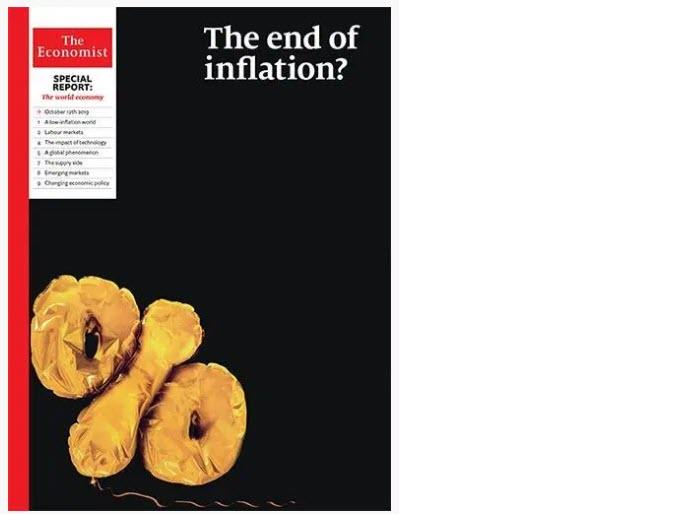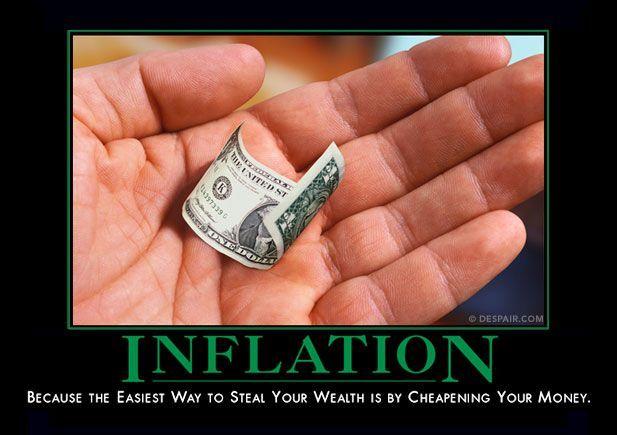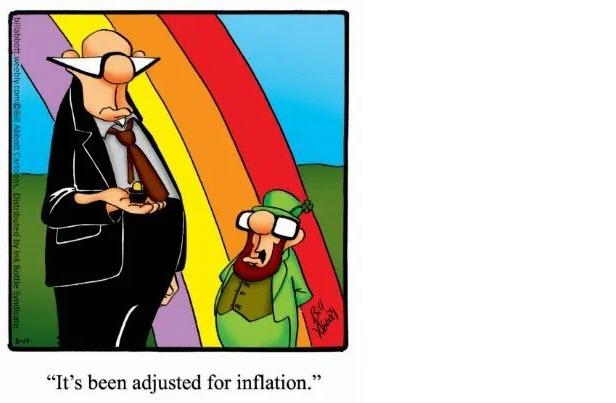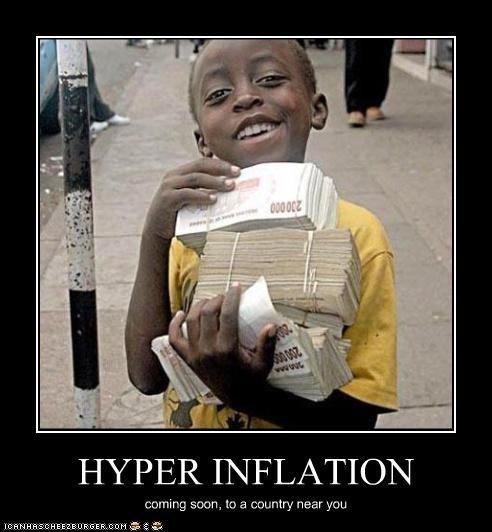“…The Road-Map Ahead Is A Market Crash, Followed By Obscene Fiscal Stimulus…”
Via AdventuresInCapitalism.com,
Investing is all about probabilities. If the perceived odds of an event are high, certain securities will be priced based on those expected probabilities. The corollary is that when an event is perceived as almost impossible, securities do not price in any chance of it occurring. If that event does occur, all sorts of securities need to re-price—often quite rapidly. I like to spend my time pondering what potential events the market completely ignores. Of all potential economic outcomes, the one that is least anticipated and least priced in, is an uptick in inflation.
It is said that generals always fight the last war. In terms of macro-portfolio wars, Japan’s experience with deflation colors all views. This seems odd to me because we have over two millennia of history showing inflation and currency debasements to be universal constants, with one outlier in Japan. The question is if Japan is the new normal or a true outlier?
Academics have studied the causes and effects of inflation ever since emperors and kings fixated on halting its effects. Despite a massive body of work, there is little agreement amongst experts on the causes of inflation. Since I tend to ignore “experts,” let me start by giving you the Kuppy definition of inflation. “Inflation is when too much of a certain currency chases a scarce resource and pushes its price higher when defined in terms of that currency.” Using that definition, we’ve actually had rather dramatic inflation over the past decade—it just hasn’t shown up yet in the core consumer goods that central bankers are often concerned about.
Did they time-stamp the cyclical low in yields?
When a country prints money, no one knows where within the economic ecosystem it will ultimately flow. If a resource is scarce, it tends to experience inflation—when it is artificially scarce, it has even more extreme inflation. Just think of where the money printing has ended up this cycle; bonds (central banks restricted supply by buying them), stocks (PE and buybacks have restricted supply), gateway city residential housing (local municipalities have restricted supply), medical costs (systematic dysfunction has restricted supply), vintage wines (they aren’t being produced anymore), college education (supply restricted again), I can go on, but you get the point. Meanwhile, traditional inflation stalwarts like food and energy have remained suppressed due to technological advancements, reduced logistical costs and excess liquidity, which has allowed capacity to overshoot and lead to price deflation. To say that we’ve not had inflation over the past decade is wrong, we just haven’t had inflation in places that are key components of the CPI basket.
However, that may be changing. I believe that the number of sectors with restricted supply are starting to expand. Let’s look at labor, which historically has been a primary source of inflation. It’s no secret that US unemployment is at historic lows, laborers now have bargaining power and wages are rapidly increasing—with increases made more extreme by minimum wage laws, healthcare inflation and new mandates in various states. The cost of labor goes into almost every finished good—particularly in a labor-intensive service economy. Politicians on both sides seem willing to pass laws that give labor a bigger share of the pie—what will that do to inflation?
Now think of energy; it’s a crazy world out there and global energy security is no longer guaranteed. Prices have been suppressed for the past few years by excess production due to uneconomic shale—that’s clearly reversing as the funding has been cut off. Where do you think energy prices go if shale growth flat-lines or goes in reverse? What about when key producing regions devolve into chaos? Tanker rates are also expanding—that increases energy prices as well.
Now think about consumer goods; the past few decades were all about increased globalization where manufacturing migrated to the cheapest possible location. Trade wars and regional balkanization upend this trend. Now there ought to be an implicit geopolitical risk premium priced into gross margins on every good. Supply chain disruptions further increase costs. If globalism was deflationary, isn’t the reverse inflationary?
Think about what venture capital has done to costs. Thousands of businesses are losing hundreds of billions a year to gain market share in rather prosaic industries. Think about what Uber has done to transport costs or Chewy has done to the cost of dog food. These are all subsidized by VC firms so they can dump IPOs on unsuspecting retail bag-holders. As these businesses are forced to raise pricing in order to become sustainable, what will that do to consumer inflation? Won’t all sorts of sectors also gain pricing power, now that they don’t have to compete with someone who sells a Dollar for 80 cents hoping to make it up with volume? Isn’t the collapse of the Ponzi Sector bubble inherently inflationary?
What about all the supply restriction as ESG takes its toll on economies? If you can’t get permits to build a new coal mine or oil pipeline, yet demand keeps growing, won’t pricing increase as well?
I can go on and on. All the trends that were deflationary are slowly going in reverse. We haven’t seen the effects of this show up in the data yet, largely because the global economy is rapidly deteriorating, which is putting a brake on the demand side. However, even with the global economy slowing, inflation is starting to tick up in the US. Can the rest of the world be far behind us?
Of course, government policy drives all of this. I think it is obvious that we’ve finally reached the limits of monetary policy. Does the ECB taking rates 10 basis points more negative do anything but accelerate the bankruptcy of the Eurozone banking system? Does it increase consumption or capital expenditures? Of course not. If anything, it just starves the system of capital by taking everyone’s return on capital investment down towards zero and below. Who invests when expected returns are negative? What the world needs is a big reset of the system where leveraged firms default, solvent firms pick up the pieces and get to earn excess returns due to their past fiscal sobriety. Since we live in a democracy, that won’t happen, instead we will have extreme fiscal stimulus in order to kick the can further down the road.
In October, I spent 15 hours in the Sheremetyevo airport in Moscow (damn connecting flight never showed). It hasn’t seen a dollar of cap-ex in years, but it’s still light years ahead of LaGuardia or LAX. Just wait until corporations learn how much they can make from a never-ending airport renovation project. Now multiply that by hundreds of airports in America that desperately need capital investment. Now add bridges, roads, bullet trains, water infrastructure and our electrical grid. Why are all the lobbyists trying to get us into wars with third world nations? Corporations would make more money fixing our infrastructure and it’s going to be a lot less politically contentious.
If you think deflation is a fact of life, you clearly haven’t paid attention to history. Governments around the world have experienced a unique decade where they ran deficits and printed money without “bad inflation” which upsets voters. They think this is a new normal with no consequences. It isn’t. They’re already panicking with the S&P a few ticks from all-time highs. Soon politicians will go into ludicrous mode with fiscal stimulus.
What will fiscal stimulus do to the equity market? I’m reminded of the 1970s—inflation is no friend to most stocks. What happens to trillions in negative yielding long-dated bonds if inflation ticks up? What happens to bond proxies like global large-cap equity indexes or real estate? What happens to risk-parity funds that are leveraged a few times over expecting bonds and equities to increase over time? What if both legs of the trade drop at the same time? No one is ready for inflation, but I believe it’s coming. Maybe not today or next week, but there is a powder keg of monetary supply just waiting to be unleashed by governments who think that inflation can never happen again. At first, markets will cheer a bit of inflation—then they’ll panic. The markets often do whatever the fewest people are positioned for. Who’s positioned for inflation? That’s about as contrarian as buying Argentine sovereign debt.
I think the road-map ahead is a market crash, followed by obscene fiscal stimulus. As always, I’m trying to think a few steps ahead here. I’m making a list of beat-down sectors who benefit from this change in government policy. I want to be ready to buy as soon as they get serious about unleashing the stimulus.
You need a crisis that’s severe enough that both political parties can agree on stimulus. We’re not there yet, but we will be. If you thought QE was nutty, wait until you see what drunken sailor mode looks like. Inflation is coming. Be VERY careful if you own assets with duration risk.
Tyler Durden
Wed, 12/04/2019 – 19:15
via ZeroHedge News https://ift.tt/34R9rrS Tyler Durden



